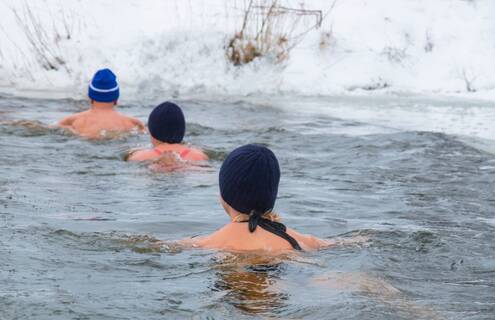
If you want to feel good, keep reading...
A man in a bathing suit walks across his snowy backyard, breaks the ice on his pond and eases his body into chilly water.
"I feel a bit of surprise, shock and pain as my body responds to the cold," says Lucian Snow, a 58-year-old Fairlee resident.
Snow is cold plunging, a therapeutic dip into frigid water that's wildly popular and packed with powerful benefits backed by science.
Cold plunging might feel jarring when you get into icy water, but you'll likely reap some mental and physical rewards.
"Within 30 seconds, I'm settled in and much more aware of my surroundings, listening to nature and being very present in that moment," Snow says.
Get in a good mood
"I would describe cold plunging as this energized, very connected feeling of being alive," says Lucy Pilcher, MSW, LICSW at Dartmouth Hitchcock Medical Center.
Studies have linked cold plunging to treating depression and improving mood. It can boost levels of dopamine and endorphins, creating alertness and happiness.
"There are lots of theories about why cold plunging helps with mental health," says Pilcher, one of a handful of Dartmouth Health practitioners we interviewed who regularly cold plunges.
"From a professional point of view, the mental health benefits come from a combination of things," she adds."There's the physiology piece, and you're also connecting with others and nature."
Sleep better
"I hate the cold, but I sleep better because of it," says Laurie Darby, RN, assistant nursing director for the emergency department at Southwestern Vermont Medical Center.
Studies have yet to show a well-established link between cold plunging and sleep, but Darby believes it helps.
"I don't know if my mind is ever stress-free, but if I don't take a cold plunge for a couple of days, I can tell," she says.
Your muscles will thank you.
Richard Powell, MD, director of the Dartmouth Hitchcock Medical Center's Heart and Vascular Center, is an avid swimmer and surfer. He regularly dips in his cold plunge tub at home.
"I'll wake up the next morning with no aches and pains from my workout the day before," he says.
That's because cold water constricts blood vessels, slows blood flow to the affected areas, and decreases inflammation, swelling and nerve activity.
Know your limits
Powell, a vascular surgeon, says cold plunging is safe if you're reasonably fit and have no history of arrhythmias, high blood pressure, diabetes, poor circulation or heart problems.
He also advises that anyone with Raynaud's phenomenon, which causes decreased blood flow to the fingers, avoid cold plunging.
"If you can go for a long walk or moderately exercise, you're probably safe to go cold plunging," he says. "In my 20 years here at Dartmouth Hitchcock Medical Center, I've never had a patient come into cardiology or the emergency room that had a complication where they said, 'I just did a cold plunge.'"
Risks, timing, and temperature
Subscribe to the Living Better newsletter
Your trusted resource for reliable and up-to-date health and wellness information in the Northeast. Get it delivered to your inbox every other week.
"There's excitement and potential benefits of cold plunging, but we also want to make sure that people are doing it safely," says Neal Goldenberg, MD, director of sports medicine at Cheshire Medical Center.
Goldenberg, an occasional cold plunger, advises to stay in the water for three minutes or less and not to cold plunge alone.
As some studies suggest, the water temperature should be at least 50 degrees, which Goldenberg also advises. But many cold plungers opt for lower temperatures, around 38 degrees or higher.
Knowing your limits and being aware of cold water risks is a must.
"You can get frostbite, hyperthermia, or your body will start shutting down, and hyperthermia specifically can be life-threatening," Goldenberg says.
Mind over matter
Humans have used cold temperatures for therapeutic purposes for centuries. For Snow of Fairlee, cold plunging is the perfect way to end his remote workday. "I love challenging myself each time I go in because it's about mind over matter," he says.
After three minutes in the pond, Snow climbs out and feels calm, clear-headed and peaceful. "There's a part of cold plunging that's all about willpower and control," he says."To me, that's very empowering."
Resources
More Dartmouth Health stories
- Dartmouth Health leads study showing what it takes to rise and shine
- How the Center for Pain and Spine treats chronic pain
- Overcoming loneliness


